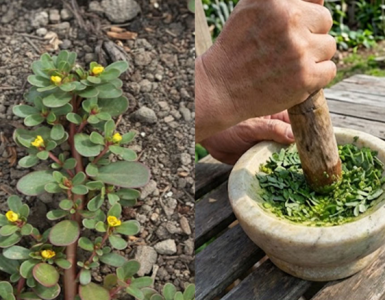The sumac tree (Rhus spp.) is a widely recognized plant known for its medicinal, culinary, and ecological benefits. Found in many parts of the world, particularly in the Mediterranean, Middle East, and North America, sumac has been used for centuries in traditional medicine and cooking. Its antioxidant, antimicrobial, and anti-inflammatory properties make it a valuable natural remedy.
Let’s explore the top benefits of sumac and how you can incorporate it into your daily routine!
1.Rich in Antioxidants – Fights Free Radicals
Sumac is packed with polyphenols and flavonoids, which help neutralize free radicals in the body.
Reduces oxidative stress, which is linked to aging and chronic diseases like cancer and heart disease.
Supports cellular repair and immune function.
How to use:
Add sumac powder to smoothies, salads, or teas for an antioxidant boost.
2.Anti-Inflammatory Properties – Relieves Pain & Swelling
Contains gallic acid and quercetin, known for their strong anti-inflammatory effects.
Helps with arthritis, joint pain, and muscle soreness.
Reduces inflammation in the digestive tract, benefiting people with IBS or gastritis.
How to use:
Drink sumac tea or use sumac-infused oil for massage on sore areas.
3.Supports Heart Health – Lowers Cholesterol & Blood Pressure ❤
Sumac has been shown to lower LDL (bad) cholesterol and improve blood circulation.
Its high potassium content helps regulate blood pressure.
Helps prevent blood clots and artery blockages.
How to use:
Incorporate sumac spice in daily meals to support cardiovascular health.
Drink sumac-infused water for a refreshing and heart-friendly drink.
4.Aids Digestion and Gut Health
Sumac is a natural digestive stimulant that helps break down fats and proteins.
Contains tannins, which support a healthy gut lining and prevent diarrhea.
Acts as a mild diuretic, helping to cleanse the kidneys and liver.
How to use:
Sprinkle sumac powder on food to aid digestion.
Drink a warm infusion of sumac and honey after meals.
5.Antimicrobial & Antifungal – Protects Against Infections
Sumac has been proven to inhibit bacterial and fungal growth, including strains like E. coli and Salmonella.
Helps treat urinary tract infections (UTIs) and prevent respiratory infections.
Can be used as a natural wound disinfectant.
How to use:
Drink sumac tea to fight infections.
Use sumac extract as a natural antiseptic for minor cuts and wounds.
6.Supports Respiratory Health – Clears Congestion
Sumac is traditionally used to treat coughs, asthma, and bronchitis.
Helps clear mucus from the lungs and eases breathing difficulties.
How to use:
Drink sumac tea with lemon and honey for relief from colds and congestion.
Inhale sumac-infused steam to open nasal passages.
7.Regulates Blood Sugar – Beneficial for Diabetics
Research suggests that sumac helps stabilize blood sugar levels by improving insulin sensitivity.
Reduces sugar spikes after meals, making it ideal for people with diabetes or prediabetes.
How to use:
Take sumac powder with meals to help regulate glucose levels.
Drink sumac-infused water for metabolic balance.
8.Enhances Skin Health – Natural Anti-Aging Remedy
The high vitamin C and antioxidant content in sumac helps reduce wrinkles and fine lines.
Fights acne and soothes skin irritations due to its antimicrobial effects.
Prevents hyperpigmentation and sun damage.
How to use:
Make a sumac face mask by mixing sumac powder with yogurt.
Use sumac-infused oil for skin hydration and healing.
9.Boosts Immune System – Natural Defense Against Illnesses
Sumac enhances white blood cell production, improving the body’s defense mechanisms.
Its vitamin C and flavonoids help strengthen immunity against colds and flu.
Helps reduce seasonal allergies by lowering inflammation.
How to use:
Consume sumac tea daily for immune support.
Add sumac to soups and broths for a natural immunity boost.
10.Culinary Versatility – A Delicious, Tangy Superfood
Sumac is widely used in Mediterranean and Middle Eastern cuisine for its tangy, lemon-like flavor.
It’s a healthier alternative to salt for seasoning foods.
Adds depth to salads, meats, hummus, and rice dishes.
How to use:
Sprinkle sumac powder over grilled meats, roasted vegetables, or hummus.
Mix with olive oil for a zesty salad dressing.
How to Use Sumac in Daily Life
Sumac Tea Recipe
Ingredients:
1 teaspoon sumac powder (or dried sumac berries)
1 cup hot water
Honey (optional)
Instructions:
Steep sumac in hot water for 10 minutes.
Strain and sweeten with honey if desired.
Drink 1-2 cups per day for maximum benefits.
Sumac Water for Detox
Ingredients:
1 tablespoon sumac powder
1 liter of water
Lemon slices (optional)
Instructions:
Mix sumac powder in water and let sit for 30 minutes.
Strain and drink throughout the day.
Sumac Spice for Cooking
Add a pinch of sumac to marinades for meats or fish.
Mix with olive oil and garlic for a tasty dip or sauce.
Use as a healthy seasoning substitute for salt.
Precautions & Side Effects
Allergic Reactions: Some people may be allergic to sumac (especially if allergic to cashews or mangoes).
Pregnant & Nursing Women: Should consult a doctor before consuming sumac in large amounts.
Oxalates Content: Sumac contains oxalates, so those with kidney stones should consume it in moderation.
Sumac is a powerful medicinal plant and spice that offers numerous health benefits, from reducing inflammation and supporting digestion to improving heart health and enhancing immunity. Whether used as a tea, supplement, or cooking ingredient, sumac is an excellent addition to a healthy, natural lifestyle.






Add comment